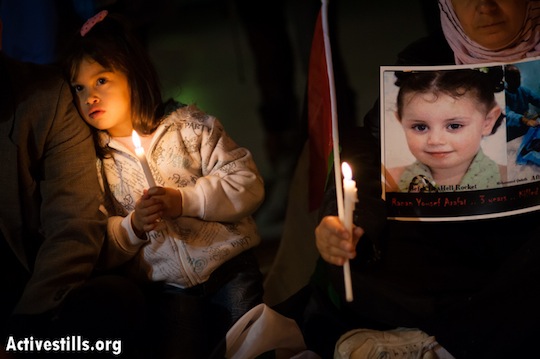Using cold logic to explain the killings of civilians is an attempt to deaden our emotions and detach us from inexplicable tragedy.
By Jake Meth

When I was younger, I always hoped that my older self would have a great explanation for why innocent civilians kept getting killed in violent conflicts. But as Israel began another air campaign against the Gaza Strip last week, I suddenly realized that this explanation for which I had waited so long was nowhere to be found.
I was 15 when the U.S. invaded Iraq, when it seemed as if every other headline in the New York Times contained a double-digit number and the word “killed.” And there were pictures, too, ugly pictures of death. At roughly the same time, the Second Intifada was raging, with Palestinian suicide bombings and Israeli reprisals filling the news. All of this violence in a far away part of the world was mixing together in my mind. I saw many pictures of dead people — maybe they were Iraqis, or Palestinians, or Israelis — and almost no pictures of dead Americans. As an impressionable teenager attempting to understand these disturbing and confusing images, I needed a comforting answer.
“They must have done something to deserve it,” I would tell myself. “That child shouldn’t have been in harm’s way in the first place. And what horrible parents he has, to leave him in danger like that!” The hardship of living as a refugee, the perils and occasional impossibility of traversing hostile borders, the potential for being captured by human traffickers — these were tangential considerations. I had to make sense of this unfamiliar world, where someone could become a casualty of war on the way to the grocery store. I was horrified by the deaths, but I didn’t know where to lay the blame. So I assigned it the easiest targets I could find: the dead themselves.
I had my doubts. As a disaffected, budding left-winger under George W. Bush, I was against the Iraq War. But I opposed it because our greedy president was out for oil, or to finish his daddy’s war, or because he was simply stupid — not because so many Iraqis and Americans were dying. I understood the Israeli conflict less, but older people would reassure me that Israel was doing what it had to do to protect itself. I was anxious for the day I would be satisfied by such a statement.
Last Thursday, a day after Israel initiated its military operation, Israeli Prime Minister Benjamin Netanyahu said during a televised news conference that Israel “will continue to do everything in its power to avoid civilian casualties.” But it clearly has not. On Sunday afternoon, an Israeli airstrike destroyed the home of Gaza’s Dalou family, killing 12 in the conflict’s deadliest attack. An Israeli military spokesperson described the strike as an accident, saying the real target had been a dangerous militant from the same neighborhood. As of noon Wednesday, the Hamas health ministry estimated that 140 Palestinians had been killed and over a thousand injured in the conflict, the majority of them non-combatants.
The first line of a Jerusalem Post story a day after the Dalou tragedy read: “Israel’s air strike on Sunday of the Dalu family is a public relations disaster.” Pouring such cold logic onto an inexplicable tragedy attempts to deaden our emotions, and detach us from the horrific images we see and indigestible casualty numbers we read. We are expected to accept these deaths as collateral damage in a larger Israeli effort to achieve security for its citizens. But for me, the image of the dead little boy being carried to his grave is no longer an abstraction; he looks far too much like the abandoned boys with dirty feet roaming the streets of downtown Cairo. I think of how my teenage self would react to this image, and I remember his doubt that he would ever find a sufficient explanation to something he found so inexplicable. I wonder if he knew, even then, that the answer would never come.
